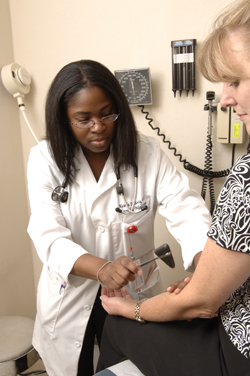Family doctors have highest discipline rate
About 62 per cent of Canadian physicians who were disciplined by medical authorities were family doctors, according to the first analysis of its kind in the country.
The study in Tuesday’s issue of the journal Open Medicine is the first time that researchers have tracked the number of doctors disciplined by provincial medical licensing authorities and why, said Dr. Chaim Bell of Toronto’s St. Michael’s Hospital.
Bell and his co-authors looked at cases of doctors who were disciplined between 2000 and 2009.
Of the 606 cases, 92 per cent of those doctors were men.
The majority were family physicians, 14 per cent were psychiatrists and nine per cent were surgeons.
Previous studies suggested that the intimate nature of the work that family physicians and psychiatrists do, combined with their direct relationships with patients, may predispose some of them to inappropriate behaviour and discipline.
 “This study constitutes an important first step in aggregating data on and understanding the extent and nature of disciplinary actions involving physicians in Canada,” the study’s authors concluded.
“This study constitutes an important first step in aggregating data on and understanding the extent and nature of disciplinary actions involving physicians in Canada,” the study’s authors concluded.
“The medical profession must realize that, although disciplined physicians represent a small proportion of the physician population, a single practitioner has tremendous potential to harm patients and the public.”
Prevention and education
The study’s authors called for programs to prevent transgressions, which they called an important area of patient safety that must be a priority for the medical profession.
The number of doctors disciplined represented only 0.06 per cent to 0.11 per cent of all physicians in Canada, the researchers said.
But 51 doctors committed 64 repeat offences, or 19 per cent of the total.
The most frequent violations were:
* Sexual misconduct, 20%.
* Failure to meet a standard of care, 19%.
* Unprofessional conduct, 16%.
The researchers called for more emphasis on sexual misconduct in medical training.
Infectious risks in family doctors’ offices
What a difference a year makes. During pandemic (H1N1) 2009, primary care providers were scurrying around offices and clinics removing books and toys from waiting rooms, positioning bottles of hand sanitizer, passing out surgical masks to patients who presented with a cough or fever and using hospital-grade disinfectant to mop up floors when a suspected H1N1 case left their office or clinic.
They were, of course, following infection control guidelines established and recommended by the College of Family Physicians (CFPC) and a number of other groups during the height of the pandemic.
As the threat fades into memory, there’s an understandable tendency to hide the mops in the closet and leave the masks in the box.
But Ontario’s top infectious disease doctor is urging primary care providers to maintain aggressive infection prevention and control measures in their practices year-round.
Returning to business-as-usual would be a mistake, says Dr. Doug Sider, acting director of infectious disease prevention and control for the Ontario Agency for Health Protection and Promotion. “To recommend that we only consider more aggressive compliance with all of these infection prevention and control measures in the face of something like pandemic influenza, and then step back, relax our vigilance, relax our expectations, relax our urging to compliance at other times, just doesn’t make a lot of sense to me.”
###
Canadian Medical Association
On average, doctors who were disciplined had been practising for 29 years, which suggests that strategies for continuing medical education are also important, Prof. Sharon Johnston of the department of family medicine at the University of Ottawa said in a journal commentary accompanying the research paper.
Two of the three specialties that were mainly involved in disciplinary action were family medicine and psychiatry — both specialties where many practioners work independently outside of hospitals that enforce codes of conduct, Johnston noted.
“Where are the violations happening?” Johnston said in an interview. “We all need to know about it so that we can look for them and then paring that with how do you not do it and how do you make sure your colleagues don’t or what do you do if you suspect it.”
Fines, suspensions and formal reprimands were the most frequent penalties. Licences were revoked for six per cent of those disciplined.
The analysis was limited to publicly available data and excluded the three territories. The researchers did not look at the degree or nature of patient complaints, only disciplinary actions.
The study’s authors also called for provincial reporting to be standardized along with the creation of a national database of physician offenders for research and educational purposes.
###
CBC News